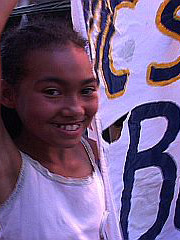Baby's First Protest
It would be nearly impossible to precisely count the number of Republican National Convention protestors that marched through midtown Manhattan earlier this month, but quite a few of them still had their baby teeth. In fact, judging from the number of strollers, many of them had to rely on their parents to do the marching for them.
Among the youngest of the crowd were Elizabeth Casey Delia Brennan and her twin sister, Mary Alice Delia Brennan, 13 months old. The two redheaded, blue-eyed girls vigorously shook capped water bottles at their parents while waiting for the rally to begin.
“It’s really important that they get experience and exposure early on to political activism,” said Maggie Brennan, their mother. “We’re trying to raise them to expose them to things, but not to force them into anything.”
The twins clearly resented being forced into their stroller seats, and Elizabeth responded by casting her water bottle onto the pavement, waiting for Brennan to retrieve it, and throwing it down again repeatedly—a mother-daughter game of fetch.
A more mellow child protestor, Jonah LeCompte, 19 months old, sat sedately in a stroller pushed by his father, Eric. The two sweated streams in the late morning sun and humidity, but Jonah quietly watched the passing circus of colors, noises, and people.
“This is the way that I want to raise him,” LeCompte said. “I want him to know that he has a constitutional right to demand that our government treat him fairly.”
Parents spoke for their children throughout the day. A few parents shrugged in agreement when asked if the kids were along because they couldn’t find a babysitter. But most insisted that their children were participating in a landmark protest that would be remembered through the ages—if not in the history books, then at least in their children’s minds.
“I wanted them to know that this is very important,” marcher Patricia Levinton said. “In 10 to 15 years, they will hear about the rally, and know that it was important that we make a stand.” Levinton attended the march with her five children, including a 3-year-old, a 5-year-old, and 10-year-old Juliette.
Juliette Levinton seemed most interested in reading protestors’ signs, but she also said she believed that children needed to attend similar events more often to show their concern for current affairs.
“It’s not only because children need to fight for what they believe in, but also because they have dreams, too—not just adults,” Juliette said.
Alex Saal, 13, chose to come to the march because, as he put it, “I don’t like Bush. He’s stupid.” His mother chimed in—“Well, that’s simplistic, but he’s 13”—until Alex elaborated further: “If Bush gets re-elected, it will be worse in the next four years. More terrorism, more problems, the rest of the world will hate us more…” and he trailed off to watch the drums and banners marching along.
Farther uptown, Shawn Chatham and his two pre-teen daughters watched the protesters. Chatham, who lives in Harlem, explained to his girls why the people were angry, and made sure to point out that they would be effective because they were organized. “Our people don’t get together like this,” said Chatham, referring to black Americans. “The most important thing is to understand that these people are trying to be seen and heard.”
All activist children who could speak and their parents were rooting for John Kerry to win the election, but what about the kids who couldn’t talk yet? What if they grew up and became Republicans?
After only the briefest of pauses, Brennan responded: “I’m their mother, so I’m going to love them no matter how they turn out.”
![]()

